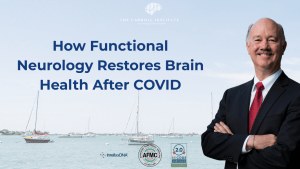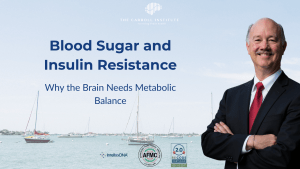How Do You Avoid Getting Alzheimer’s Disease?
Last Updated: October 2025
- Yes, it’s possible to avoid Alzheimer’s by identifying and correcting the root causes that lead to cognitive decline long before symptoms appear.
- To reduce your risk, focus on a low-carb, anti-inflammatory diet, balanced hormones, restorative sleep, and a toxin-free environment.
- The Carroll Institute in Sarasota, FL, uses Bredesen ReCODE and functional neurology to uncover hidden risks and strengthen brain health.
- Although genetics play a role, your daily habits, environment, and metabolic health determine your long-term brain resilience.
Key Points
- Alzheimer’s risk is modifiable, not fixed.
- Root causes include chronic inflammation, insulin resistance, toxin exposure, hormonal decline, and nutrient deficiencies.
- Functional medicine and neurological care can identify and correct those causes early.
- Comprehensive prevention strategies may lower your lifetime Alzheimer’s risk by up to 90%.
At The Carroll Institute, our ReCODE-based prevention programs address lifestyle and metabolic risk factors before symptoms begin.
Understanding Prevention: You Can Change the Brain’s Trajectory
Many people believe Alzheimer’s disease is inevitable, especially if it runs in the family. However, research shows that the disease develops gradually—often over decades—and can frequently be prevented. During this time, small but ongoing issues like blood sugar imbalance, chronic inflammation, toxin exposure, and hormone decline can quietly weaken the brain’s repair systems.
The encouraging news is that these factors are both detectable and reversible. By making proactive changes and correcting underlying imbalances, you can slow or stop the processes that drive brain aging. At The Carroll Institute in Sarasota, FL, we use the Bredesen ReCODE protocol together with functional neurology to uncover these hidden risks, optimize brain metabolism, and restore cognitive vitality.
The Root Causes You Must Address to Avoid Alzheimer’s
1) Chronic Inflammation
Inflammation is one of the strongest predictors of Alzheimer’s disease. It disrupts communication between neurons and accelerates cell damage. To reduce inflammation, follow an anti-inflammatory diet that includes colorful vegetables, wild-caught fish, olive oil, and antioxidants. Additionally, avoid processed foods, refined sugars, and vegetable oils. Moreover, addressing gut inflammation, chronic infections, and autoimmune triggers can further protect your brain from inflammatory damage.
2) Insulin Resistance and Blood Sugar Imbalance
High insulin levels starve brain cells of energy and increase plaque formation—a condition sometimes referred to as “type 3 diabetes.” Therefore, choose a low-carb or ketogenic-style diet emphasizing protein, healthy fats, and non-starchy vegetables. In addition, regular exercise and intermittent fasting help restore insulin sensitivity and brain energy metabolism.
3) Hormone Decline
Estrogen, testosterone, thyroid, and cortisol all play essential roles in brain repair and mood regulation. When these hormones decline, memory and focus can suffer. Consequently, it’s important to test your hormone levels and rebalance them naturally or with bioidentical therapy under professional supervision. Balanced hormones not only improve mental clarity but also enhance sleep and emotional stability.
4) Toxic Load
Every day, we are exposed to environmental toxins that can burden the brain—such as heavy metals, pesticides, and mold toxins. Over time, these can accumulate and interfere with brain signaling. To reduce your toxic load, purify your indoor air and water, choose natural cleaning and skincare products, and minimize exposure to plastics and fragrances. Furthermore, targeted detoxification—guided by a clinician—can safely lower toxin levels and reduce oxidative stress.
5) Nutrient Deficiencies
Deficiencies in omega-3 fatty acids, B vitamins, vitamin D, and key minerals can compromise brain function and repair. Therefore, focus on nutrient-dense, whole foods such as fatty fish, leafy greens, nuts, and seeds. In addition, lab testing can help tailor a supplement plan to restore optimal nutrient levels and improve brain metabolism.
6) Poor Sleep and Circadian Rhythm
During deep sleep, your brain clears out toxins and consolidates memories. However, when sleep is disrupted, beta-amyloid and tau proteins can accumulate, increasing Alzheimer’s risk. Aim for 7–8 hours of high-quality sleep, maintain consistent bedtimes, and avoid screens before bed. In addition, supporting melatonin and cortisol balance can restore your circadian rhythm.
7) Lack of Movement and Mental Stimulation
The brain thrives on movement and challenge. Regular exercise boosts blood flow, oxygen, and brain growth factors. Likewise, mental stimulation—such as learning a new language or skill—builds new neural pathways. Therefore, combine physical activity with cognitive engagement and mindfulness to keep your brain adaptable and resilient.
The Carroll Institute Approach to Alzheimer’s Prevention
At The Carroll Institute, we integrate functional medicine, the ReCODE protocol, and functional neurology to prevent Alzheimer’s disease before it starts. Our goal is to identify early warning signs, correct metabolic and neurological imbalances, and guide patients toward a brain-healthy lifestyle that lasts a lifetime.
- Comprehensive testing: Detailed labs for glucose, inflammation, hormones, toxins, and nutrient balance.
- Root-cause mapping: Identifying metabolic, hormonal, and neurological factors contributing to risk.
- Personalized plan: Nutrition, detoxification, supplementation, sleep, and lifestyle optimization.
- Functional neurology: Targeted exercises that strengthen brain networks and improve focus.
- Ongoing tracking: Routine follow-ups to maintain progress and reinforce brain resilience.
As a result of this multi-faceted approach, patients not only lower their risk of Alzheimer’s but often experience better memory, focus, and emotional balance.
For more on what contributes to cognitive decline, see why drugs alone can’t stop Alzheimer’s.
Early Prevention Is the Most Effective “Treatment”
Ultimately, Alzheimer’s prevention starts long before symptoms. Even if you have the APOE4 genetic variant or a strong family history, early action can significantly alter your brain’s future. By keeping inflammation low, supporting metabolic health, and maintaining hormonal balance, you can preserve clarity and cognitive performance well into later years.
When to Seek a Brain Health Assessment
- Family history of Alzheimer’s or dementia
- Brain fog, poor memory, or low focus
- Insulin resistance, thyroid issues, or chronic inflammation
- Desire to take proactive steps before symptoms appear
Taking action early gives your brain the best opportunity to heal and thrive. Moreover, a professional cognitive evaluation can identify risk factors long before they cause damage, allowing for true prevention.
Related Reading
- Can Alzheimer’s Be Prevented?
- Why There Isn’t an Effective Drug
- Why Your Doctor May Not Know About This
Book a Discovery Call to learn how prevention starts now.
Sources
- Reversal of Cognitive Decline: A Novel Therapeutic Program
- Precision Medicine Approach to Alzheimer’s Disease
- Rationale for a Multi-Factorial Approach for the Reversal of Cognitive Decline
- Sustained Cognitive Improvement Following a Precision Medicine Protocol
Medically reviewed by Dr. Garland Glenn, DC, PhD, IFM, AFMC
Last Updated: October 2025
The Carroll Institute — serving patients in Sarasota, FL
Learn about our ReCODE Program | About Dr. Glenn | About Alzheimer’s & Cognitive Decline | Book a Discovery Call
This content is for educational purposes only and does not substitute for personalized medical advice.

Dr. Garland Glenn, DC, PhD, IFM, AFMC
Founder & Clinical Director, The Carroll Institute — Sarasota, FL
Dr. Garland Glenn is a board-certified chiropractic physician and functional medicine practitioner specializing in cognitive health, neurodegeneration, and root-cause medicine. Certified as an AFMC (Advanced Functional Medicine Clinician) and Institute for Functional Medicine (IFM) trained, he has also completed over 500 hours of advanced training in Functional Neurology under Dr. Ted Carrick, founder of the Carrick Institute.
At The Carroll Institute, Dr. Glenn leads Sarasota’s only ReCODE-certified Functional Neurology program, helping patients reverse or prevent cognitive decline through the Bredesen ReCODE Protocol, neuroplasticity exercises, and personalized functional medicine care.
Learn more about his background and approach at About Dr. Garland Glenn.
– schedule now –
free discovery call
To help you get started, we offer a free 20-minute Discovery Phone Consultation. During this call, you will be able to talk with one of our Certified Brain Health Coaches about what going on with you or your loved one and find out if we can help. Please review our FAQs prior to scheduling your free call. We look forward to talking with you soon and helping you Save Your Brain.
(yes, it’s totally free!)
ReCODE® is a registered program developed by Dr. Dale Bredesen and licensed through Apollo Health. Dr. Garland Glenn is a certified ReCODE practitioner.



